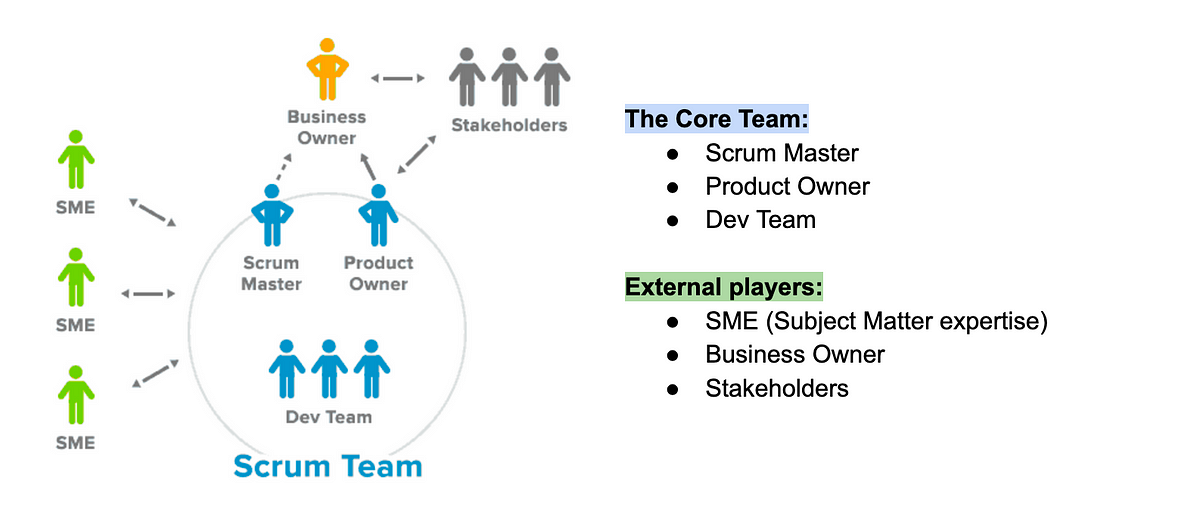External management in Scrum team can hinder team autonomy and disrupt the agile process. Proper collaboration is crucial for effective project management.
Embracing an Agile mindset with external management can lead to improved productivity and team dynamics. By fostering open communication and transparency, external management can align with the Scrum principles. It is necessary for external managers to understand and support the Agile methodology to ensure successful project delivery.
We will explore the impacts of external management on Scrum teams and strategies to foster a collaborative and efficient work environment.

Credit: www.slideshare.net
What Is External Management?
In the Scrum framework, external management refers to the individuals or entities outside of the Scrum team who have an impact on the team’s work, projects, or decisions. Although the Scrum team operates with a high level of autonomy, there are instances where external management may exert influence or have responsibilities that affect the team’s performance and deliverables.
Definition Of External Management
External management in the context of Scrum pertains to the stakeholders, executives, or department heads who may oversee the activities, resources, or outcomes of the Scrum team. While the Scrum team operates with self-organization and cross-functional capabilities, external management can still play a crucial role in providing guidance, setting priorities, and aligning the team’s efforts with larger organizational objectives.
Examples Of External Management In Scrum
1. Product Owners: The Product Owner, although a member of the Scrum team, represents the interests of stakeholders and often makes decisions that impact the project based on external demands.
2. Project Managers: In some organizations, traditional project managers may coexist with Scrum teams, having oversight and governance responsibilities that influence the team’s operations.
3. Leadership Teams: Executives or leadership teams outside of the Scrum team may have input on high-level strategic decisions, resource allocations, and risk management that directly affect the team’s work and priorities.
4. Subject Matter Experts: External experts or consultants brought in for specific knowledge or skills may contribute to the team’s work, influencing the technical or functional aspects of the project.
Credit: www.romanpichler.com
Benefits Of External Management In Scrum
Increased Focus On Project Goals
External management helps teams stay laser-focused on achieving project objectives.
Access To Specialized Expertise
Bringing in external managers provides access to specific skills needed for project success.
Challenges Of External Management In Scrum
External management in Scrum poses unique challenges to the team. Balancing the needs and expectations of external managers with the self-organizing nature of Scrum can be complex. Effective communication, alignment, and collaboration are essential to ensure a smooth integration and to achieve project success.
Challenges of external management in Scrum can hinder team effectiveness.Communication Barriers
External management can lead to communication barriers between team and managers.
- Lack of direct interaction affects clarity and responsiveness.
- Important details lost in translation can impact project progress.
Loss Of Autonomy For The Scrum Team
External management may result in loss of autonomy for the Scrum team.
- Decisions may be imposed without team involvement.
- Creative freedom and ownership of work may diminish.

Credit: oldane-graham.medium.com
Tips For Effective External Management In Scrum
Establish clear communication channels
Clear communication channels are essential for effective external management in Scrum. Establishing regular and open lines of communication between the external manager and the Scrum team help prevent misunderstandings and promote collaboration.
Foster collaboration between the external manager and the Scrum team
Fostering collaboration between the external manager and the Scrum team strengthens the working relationship and facilitates shared understanding of goals and priorities. It is important to encourage open and respectful communication to maximize the effectiveness of the entire team.
Maintain transparency and trust
Maintaining transparency and trust builds a positive working environment within a Scrum team. Open and honest communication helps to establish and solidify trust between the external manager and the Scrum team, ultimately aiding in achieving common goals and delivering successful projects.
Frequently Asked Questions On How Is Management That Is External To The Scrum Team
How Is Management External To The Scrum Team Involved In The Scrum?
Management external to the Scrum team supports and guides the team. They provide resources, remove obstacles, and prioritize work based on customer feedback. Daily interactions and communication help the management team understand progress and make informed decisions.
How Is Management That Is External To The Scrum Team Involved In The Daily Scrum Quizlet?
Management external to the Scrum team observes the Daily Scrum to understand progress and offer support as needed. They do not actively participate in the meeting.
Who Are People External To The Scrum Team?
Individuals from outside the Scrum team, such as stakeholders and managers, are considered external members.
How Is Management Involved In Scrum?
Management in Scrum participates in setting goals, removing impediments, and supporting the team’s progress. They ensure alignment with the organization’s objectives and foster a collaborative, self-managing environment for the team.
Conclusion
Incorporating external management can bring valuable perspectives and expertise to a Scrum team. By leveraging the knowledge and skills of individuals outside the team, it is possible to enhance collaboration and drive better outcomes. As teams continue to evolve, embracing external management can help foster a culture of continuous improvement and innovation.
